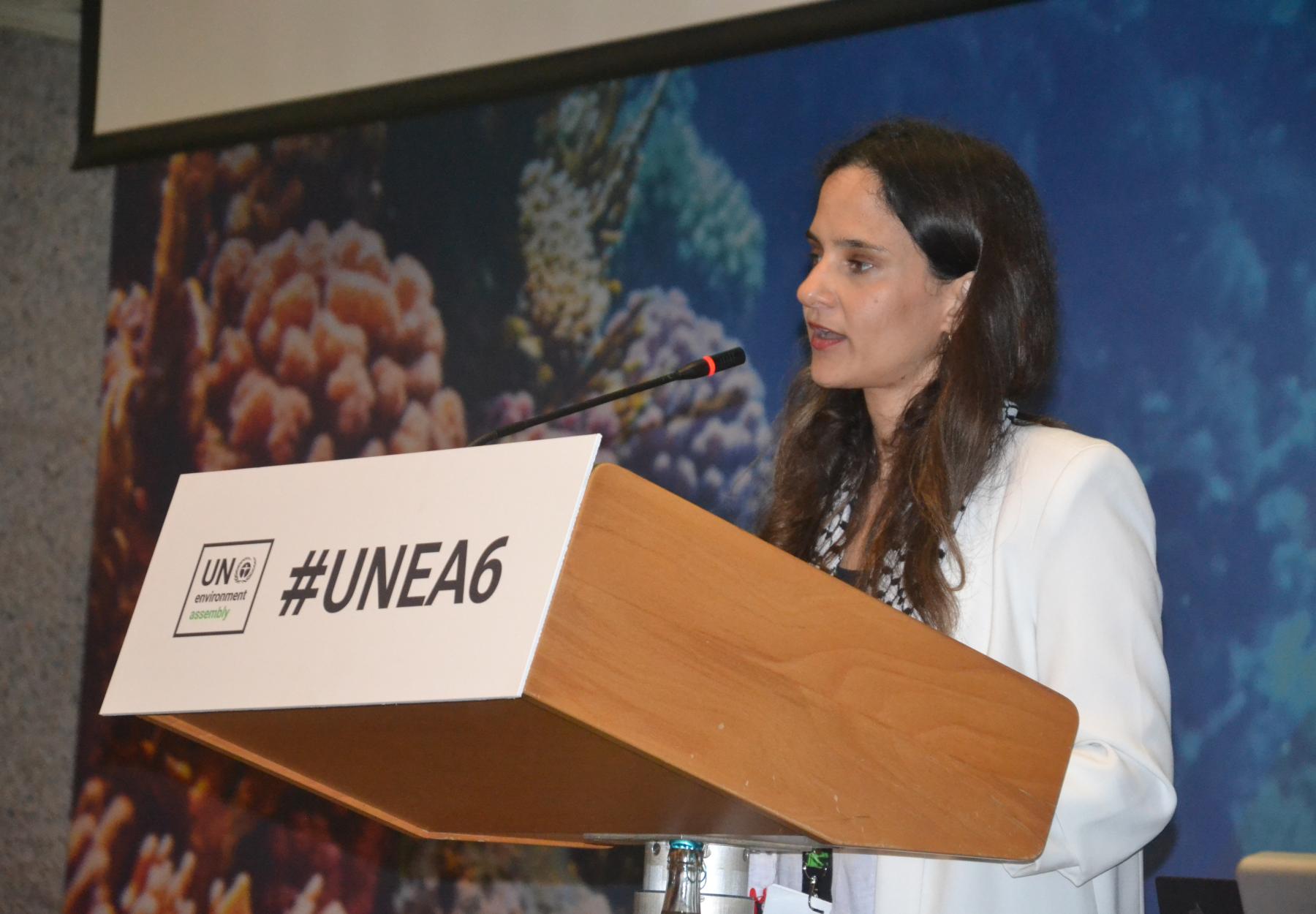
APN | Nairobi – Kenya
22 - 26 February 2024
As the genocide in Gaza enters its 140th day, government delegates from around the world gathered in the Kenyan capital Nairobi for the sixth session of the United Nations Environment Assembly (UNEA), the world's highest decision-making body on the environment.
The sessions were marked by intense dialogues and discussions, in which APN and its partners played a role in pushing for Gaza and Palestine to be prioritized on the agenda.
Major Groups and Other Stakeholders Forum (GMGSF)
During the Major Groups and Other Stakeholders Forum (GMGSF) meetings, APN General Manager, Mariam Al Jaajaa, fought to deliver a speech about Gaza in the opening session (click here to listen to the speech). Despite organizers' insistence on Al Jaajaa being "diplomatic", she addressed the imposed diplomacy, commencing her speech by stating that “76 years of settler-colonialism, brutal military occupation, and apartheid had barred Palestinians from their natural resources, lands, water, and basic human rights and human dignity. Ethnic cleansing has been the ambition, commencing with the complete destruction of over 530 villages in 1948, and persisting to the current genocide in Gaza. Attempting to uproot a population from the earth that they nurtured and had embraced them for thousands of years”.
Al Jaajaa highlighted the environmental impacts of the occupation's tactics throughout the years, highlighting that in the ongoing war alone, the occupation dropped over 65,000 tons of explosives on Gaza's densely populated areas and agricultural lands. This amount equates to three times the force of the Hiroshima bomb. Moreover, during the first two months of the current war on Gaza, greenhouse gas emissions surpassed those produced by 20 climate-vulnerable countries within a year.
Al Jaajaa also played a pivotal role in coordinating a silent protest outside the conference venue, where symbolic banners expressing solidarity with Gaza were displayed since it was not allowed to mention specific regions.
UNEA-6 Opening Session
APN, represented by General Manager, Mariam Al Jaajaa, garnered the trust of the six regions within the major groups and other stakeholders of UNEP to deliver a joint statement on their behalf at the conference's opening session (click here to listen to the statement). This session coincided with the 143rd day of the ongoing genocide in Gaza, a matter of global concern. However, most speakers, particularly from the Arab region, avoided addressing this issue, except for the delegate from the Republic of Colombia, the representative of the Workers and Trade Unions Major Group, and Al Jaajaa herself. In the joint statement, Al Jajaa emphasized that the unwavering commitment to respecting human rights is a prerequisite for advancing the common environmental agenda. She highlighted the rights to food security and food sovereignty as fundamental human rights and stressed the urgent need to dismantle oppressive regimes, end occupations, halt the destruction of functional landscapes, cease war crimes and genocides, support the decolonization process, and protect the right to self-determination.
Al Jaajaa diverged from the established conference protocol for civil society representatives by issuing a joint call for a ceasefire in Gaza.
Open-Ended Committee of Permanent Representatives (OECPR)
During the meetings of the Open-Ended Committee of Permanent Representatives (OECPR), Al Jaajaa, APN made an intervention in her capacity as the representative of the Farmers major group on a draft resolution on environmental assistance in conflict-affected areas. In her statement, she underscored the significance of incorporating "protection of the environment and natural resources of peoples under oppression, domination, and occupation" into the draft resolution. Additionally, Al Jaajaa emphasized the removal of the word "terrorism", which had been added to the draft resolution by representatives of Western governments, noting that there is no universally agreed-upon definition for it. She indicated that to ensure post-war recovery and conflict prevention, it is crucial to advocate for the incorporation of compensations for the economic, social, and environmental damages caused by environmental harm during armed conflicts. This includes infrastructure destruction, population displacement, loss of livelihood, and collapse of healthcare systems.
UNEA-6 Side Event on the Role of Women Grassroots Environmental Defenders
During the side events on the conference's final day, Al Jaajaa delivered a presentation on the repercussions of the occupation on women in Palestine which include administrative detention of women, including pregnant women, as well as the physical, verbal, and sexual violence imposed by the occupation. In addition to limiting their right to mobility and its impact on their health and childbirth cases at checkpoints. Regarding Gaza, Al Jaajaa emphasized the absence of a division between women and men, as they collectively endure ethnic cleansing and genocide. Not only are women directly impacted by these atrocities, but they also bear the compounded burden of losing their husbands, sons, and brothers. This loss often thrusts them into the role of sole breadwinners for their families.
She elaborated further, noting that women experience disproportionate effects on their nutrition and health. In times of food scarcity, they often prioritize their children and families over themselves, despite their significant need for protein, particularly during pregnancy and lactation. This deficiency not only impacts the women themselves but also affects their fetuses and newborns. Additionally, the lack of access to essential healthcare in Gaza exacerbates health issues among women.